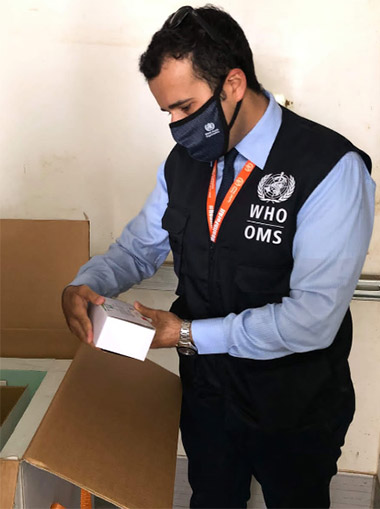Djibouti second country in the Middle East and North Africa region to receive COVID-19 vaccines through the COVAX Facility
 Djibouti 6 March 2021 – Djibouti is the second country in the Middle East and North Africa (MENA) region, to receive vaccines against COVID-19 following the arrival of a first shipment of AstraZeneca/Serum Institute of India (SII) vaccine at Djibouti International Airport. The vaccines were delivered with UNICEF’s support through COVAX, a coalition co-led by the World Health Organization (WHO), Gavi, the Vaccine Alliance, and the Coalition for Epidemic Preparedness Innovations (CEPI) that ensures fair and equitable distribution of COVID-19 vaccines to countries regardless of their income.
Djibouti 6 March 2021 – Djibouti is the second country in the Middle East and North Africa (MENA) region, to receive vaccines against COVID-19 following the arrival of a first shipment of AstraZeneca/Serum Institute of India (SII) vaccine at Djibouti International Airport. The vaccines were delivered with UNICEF’s support through COVAX, a coalition co-led by the World Health Organization (WHO), Gavi, the Vaccine Alliance, and the Coalition for Epidemic Preparedness Innovations (CEPI) that ensures fair and equitable distribution of COVID-19 vaccines to countries regardless of their income.
The delivery follows the arrival of a quantity of syringes, part of a Gavi-funded and supported global stockpile, that UNICEF delivered on behalf of the COVAX Facility last Saturday 27th February 2021. WHO has worked with national authorities to put a vaccination strategy in place that includes training vaccinators, ensuring vaccine safety, and surveillance for adverse effects.
This first shipment of vaccines will support the vaccination of health care workers, people over 50 years of age and people with comorbidities.
Through this contribution and Djibouti's commitment to continue its efforts to curb and end the pandemic, the country aims to ensure the continuity of facilities and access to essential services.
HE Mohamed Warsama Dirieh, Djibouti's Minister of Health, appreciated the work of all partners who enabled Djibouti to receive vaccines against COVID-19 through the COVAX Facility.
“The vaccines are a critical part of controlling the spread of the virus and our eventual return to normalcy,” said HE Mohamed Warsama Dirieh. He urged those eligible to register and get vaccinated as soon as possible.
Globally Djibouti has been able to contain the spread of the virus in the country through preventive actions. The country has 6,102 persons diagnosed positive for COVID-19 with 63 deaths due to the infection with this virus, and this since the appearance of the first case in Djibouti on March 18, 2020.
“Today is a new phase against COVID-19 in Djibouti, thanks to the COVAX Facility, the contribution of GAVI, and the commitment of the Djiboutian authorities. We and all the partners are impatient to start the vaccination of the eligible people in order to ensure maximum protection of the population and to put an end to this pandemic and return to a normal life”, said Melva Johnson, UNICEF representative in Djibouti.
“The arrival of these vaccines marks a new phase in the ongoing response to COVID-19 in Djibouti. The more people who are vaccinated, the more effective the vaccines will become in slowing the spread of the virus, drive down infection rates and protect the whole of society. But we should always remember that vaccinations only work when they are combined with all other public health strategies,” said Dr Mondher Letaief, WHO Representative in Djibouti.
“It is beyond exciting to know that COVAX vaccines are landing in Djibouti. Thanks to all Djiboutians and partners that have worked without defeat to achieve this first milestone. This is just the beginning; we will deliver vaccines to all in need,” said Ricard Lacort GAVI Senior Country Manager for Afghanistan and Djibouti.
With Gavi support, WHO and UNICEF will work with the Government of Djibouti to launch and roll out the national vaccine campaign to reach all eligible persons with vaccines.
Notes to Editors:
COVAX is working to ensure that all countries participating in the Facility (currently 190 including Djibouti) have equitable access to at least 2 billion doses of the COVID-19 vaccine by the end of 2021. The additional consignments of the vaccines for Djibouti are expected to arrive in the second quarter of 2021.
For more information, please contact:
Inas Hamam, communications officer
WHO


